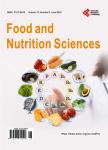Relationship between Overweight and Dietary Patterns in Brazilian Preschoolers
Relationship between Overweight and Dietary Patterns in Brazilian Preschoolers作者机构:Department of Nutrition Universidade Federal dos Vales do Jequitinhonha e Mucuri Diamantina Brazil Department of Paediatrics Universidade Federal de Minas Gerais Belo Horizonte Brazil Department of Nutrition Universidade Federal de Vicosa Vicosa Brazil
出 版 物:《Food and Nutrition Sciences》 (食品与营养科学(英文))
年 卷 期:2017年第8卷第6期
页 面:598-612页
学科分类:1002[医学-临床医学] 100201[医学-内科学(含:心血管病、血液病、呼吸系病、消化系病、内分泌与代谢病、肾病、风湿病、传染病)] 10[医学]
主 题:Dietary Patterns Nutritional Assessment Overweight Childhood Dietary Intake
摘 要:Background/Objectives: The prevalence of overweight in children is a growing health problem. The aim of this study was to investigate the relationship between overweight and dietary patterns in preschoolers. Methods: In total, 232 preschoolers (age 5) residing in the city of Diamantina, Brazil, were evaluated. Dietary intake from a food frequency questionnaire, anthropometric parameters and socioeconomic/behavioral information from a questionnaire were evaluated using a cross-sectional design. Dietary patterns were identified using principal component analysis, and the relationship between overweight and dietary patterns was examined by logistic regression analysis. Results: “Mixed diet, “snack and “unhealthy dietary patterns were identified. Children daughters of obese mothers, and those who had higher average weight gain in the first four months of life had a significantly higher chance of being overweight (respective values: OR = 3.81;p = 0.002;and OR = 2.97;p = 0.009). Higher levels of maternal education were associated with higher “mixed diet scores (p 0.001), whereas lower levels of maternal education (p 0.001), higher per capita income (p 0.001) and higher average weight gain from 0 to 4 months (p = 0.002) were associated with higher “snack scores. Higher per capita income was also associated with lower “unhealthy scores (p Conclusions: In the present study, overweight was not associated with dietary pattern. However, unhealthy eating habits are known to be risk factors for overweight, and considering that eating habits are formed in childhood, it is very important that healthy eating be encouraged in the family environment and in other spaces like childcare and school.



